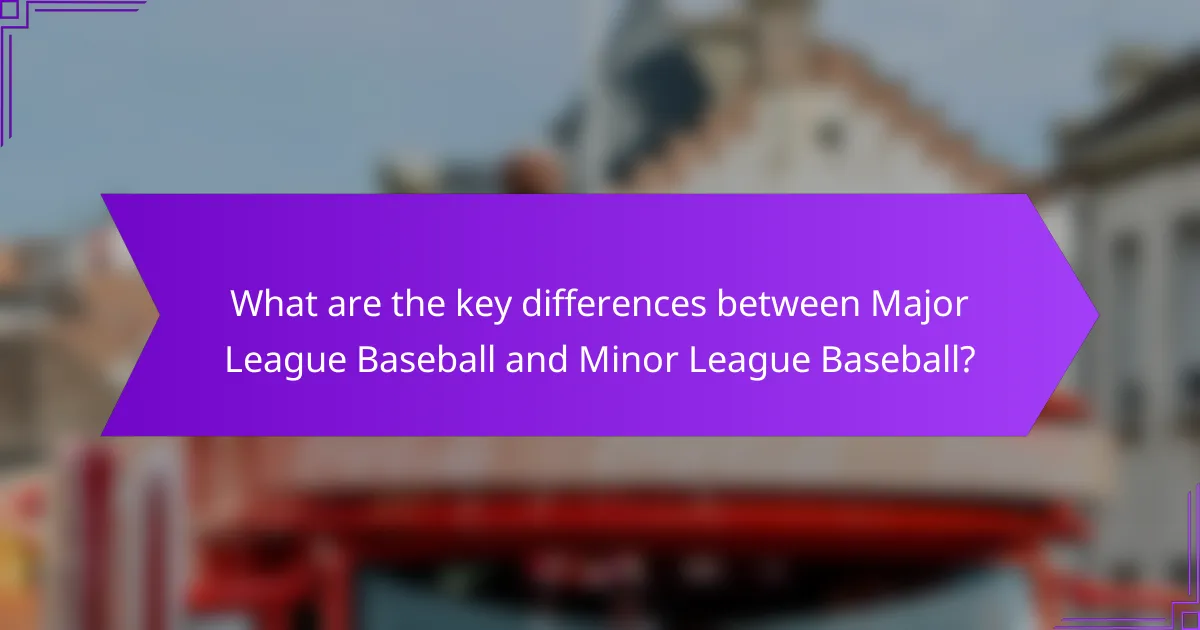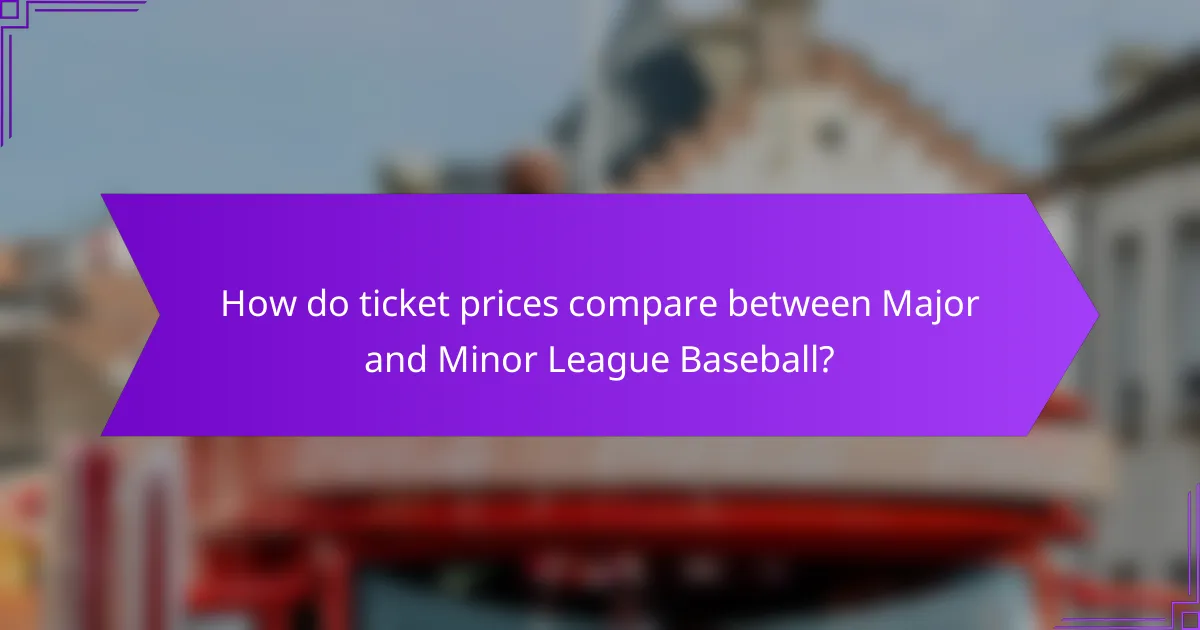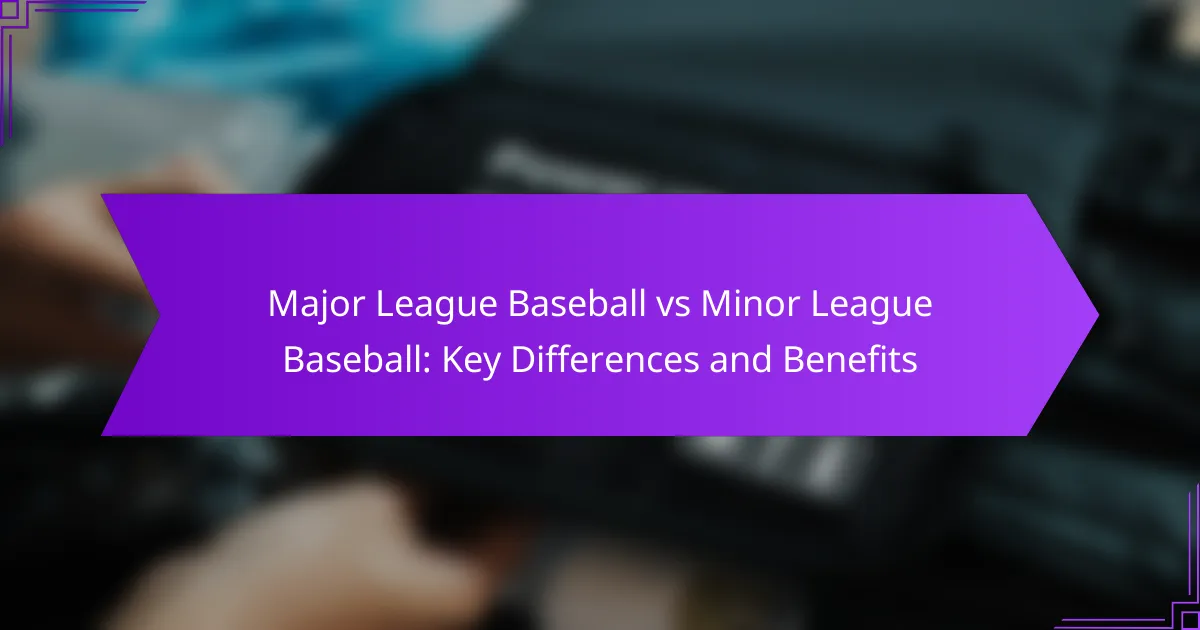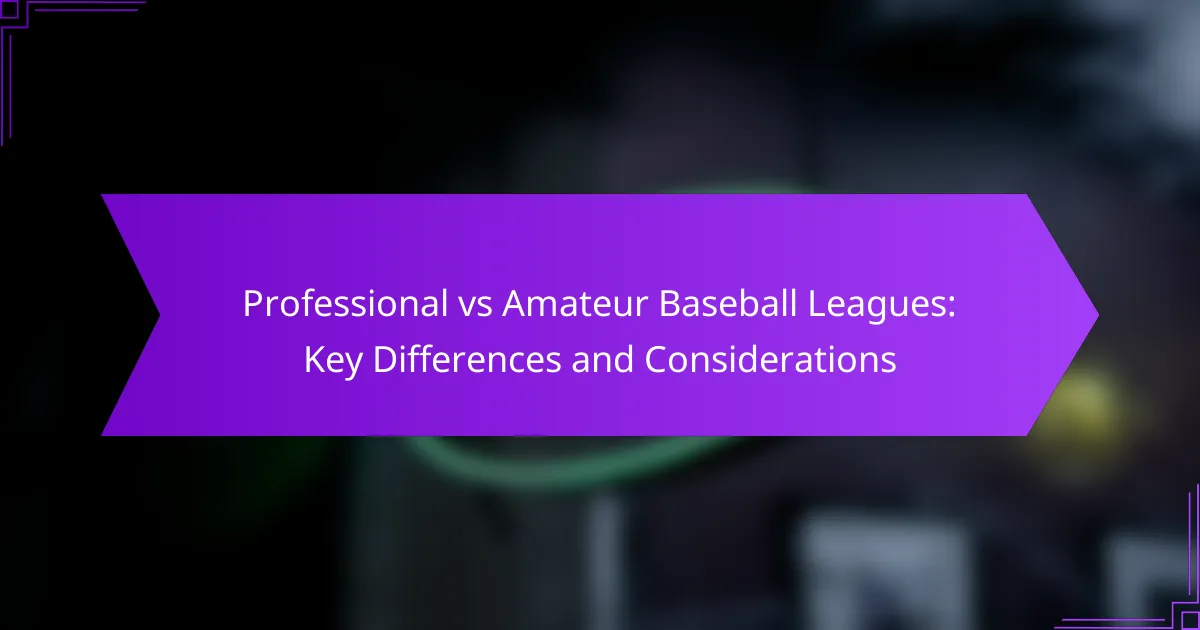Major League Baseball (MLB) and Minor League Baseball (MiLB) cater to different audiences and serve distinct purposes within the sport. While MLB showcases the pinnacle of professional baseball with star players and thrilling competition, MiLB focuses on player development and provides a more affordable, community-oriented experience for fans. Understanding these differences can enhance your appreciation for both levels of play.

What are the key differences between Major League Baseball and Minor League Baseball?
Major League Baseball (MLB) and Minor League Baseball (MiLB) differ significantly in terms of level of play, player development, franchise structure, fan experience, and game scheduling. MLB represents the highest level of professional baseball, while MiLB serves as a developmental platform for aspiring players and a more localized entertainment option for fans.
Level of play
The level of play in Major League Baseball is significantly higher than in Minor League Baseball. MLB players are among the best in the world, showcasing advanced skills, strategies, and physical abilities. In contrast, Minor League players are often developing their skills and may vary widely in talent and experience.
Games in MLB typically feature faster pitching, more strategic gameplay, and higher overall competition. Minor League teams often include younger players, recent draftees, and veterans looking to make a comeback, leading to a more unpredictable level of play.
Player development
Minor League Baseball is primarily focused on player development, serving as a stepping stone for athletes aiming to reach the major leagues. Teams in MiLB provide players with the opportunity to refine their skills, gain experience, and receive coaching tailored to their growth.
Players in MiLB can be promoted to MLB based on their performance and readiness, with many top prospects starting in the lower levels of the minors before advancing. This system allows MLB teams to cultivate talent and assess player potential over time.
Franchise structure
The franchise structure of Major League Baseball is more established and financially robust compared to Minor League Baseball. MLB teams operate under a centralized system with strict regulations, revenue sharing, and collective bargaining agreements that govern player contracts and team operations.
In contrast, Minor League teams are often independently owned and operate under affiliations with MLB franchises. These affiliations can change, and the financial stability of MiLB teams can vary greatly, impacting their ability to attract talent and maintain operations.
Fan experience
The fan experience in Major League Baseball is characterized by larger stadiums, higher ticket prices, and a more extensive range of amenities. MLB games often feature elaborate entertainment options, including themed nights, celebrity appearances, and premium seating.
Minor League games, on the other hand, offer a more intimate atmosphere with lower ticket prices and family-friendly promotions. Fans can enjoy close-up interactions with players and a more relaxed environment, making MiLB games appealing for local communities.
Game scheduling
Major League Baseball has a more structured and extensive game schedule, typically featuring 162 games in a regular season that runs from late March to late September. This rigorous schedule demands a high level of endurance and performance from players.
Minor League Baseball schedules are generally shorter, with many teams playing around 140 games in a season. The MiLB season usually runs from early April to early September, allowing for a more manageable pace for players and teams, while still providing ample opportunities for fan engagement.

What are the benefits of attending Major League Baseball games?
Attending Major League Baseball (MLB) games offers fans an unparalleled experience with high-level competition, access to star players, and exciting events. These elements create a vibrant atmosphere that enhances the enjoyment of the game.
High-quality competition
MLB features the highest level of baseball competition, showcasing the best talent in the sport. Fans can expect to see intense matchups and exceptional skill, as teams compete for prestigious titles and playoff spots.
The quality of play in MLB is significantly higher than in Minor League Baseball, with players often possessing years of professional experience. This level of competition can lead to thrilling games and memorable moments that resonate with fans.
Star player access
One of the key benefits of attending MLB games is the opportunity to see star players in action. Major League teams often feature renowned athletes who are household names, making each game a chance to witness greatness.
Fans can enjoy the excitement of watching these stars perform live, from home runs to spectacular defensive plays. This access to elite talent is a major draw for many attendees, enhancing the overall experience of the game.
Major events and promotions
MLB games often include special events and promotions that add to the fan experience. These can range from themed nights to giveaways, creating a festive atmosphere that goes beyond the game itself.
Major events, such as the All-Star Game and postseason playoffs, attract significant attention and provide unique experiences for fans. Attending these games can offer unforgettable moments, making them a worthwhile investment for baseball enthusiasts.

What are the benefits of attending Minor League Baseball games?
Attending Minor League Baseball games offers several advantages, including lower ticket prices, a more intimate viewing experience, and opportunities to engage with the local community. Fans can enjoy high-quality baseball without the high costs often associated with Major League games.
Affordability
Minor League Baseball games are generally much more affordable than Major League games. Ticket prices typically range from a few dollars to around twenty dollars, making it accessible for families and casual fans. Additionally, concessions are often cheaper, allowing for a full day of entertainment without breaking the bank.
Many teams also offer promotional nights, such as “Dollar Dog Night” or discounted family packages, further enhancing affordability. This makes it easier for fans to attend multiple games throughout the season.
Family-friendly atmosphere
The atmosphere at Minor League Baseball games is often more relaxed and family-friendly compared to Major League venues. Teams frequently host events aimed at children, such as post-game fireworks, mascot interactions, and kids’ zones with games and activities. This creates a welcoming environment for families.
Moreover, the smaller stadiums allow for closer seating to the action, making it easier for children to engage with the game and players. Parents can feel comfortable bringing their kids without the overwhelming crowds often found at Major League games.
Community engagement
Minor League teams are deeply rooted in their local communities, often participating in outreach programs and charity events. This connection fosters a sense of belonging and pride among fans, as they support a team that represents their area. Many teams collaborate with local businesses, enhancing community ties.
Attending these games allows fans to meet players and staff, creating a more personal connection to the sport. Community events, such as “Meet the Team” nights, further strengthen these relationships, making fans feel like they are part of the team’s journey.

How do ticket prices compare between Major and Minor League Baseball?
Ticket prices for Major League Baseball (MLB) are generally higher than those for Minor League Baseball (MiLB). While MLB tickets can range significantly based on the team and location, MiLB offers a more affordable experience, making it accessible for families and casual fans.
Average ticket prices for MLB
The average ticket price for MLB games typically falls within the range of $30 to $50, though premium games and seating can push prices much higher. Major cities and popular teams often see prices exceeding $100 for key matchups or playoff games. Fans should consider purchasing tickets in advance or looking for promotions to secure better deals.
Average ticket prices for MiLB
In contrast, Minor League Baseball tickets are generally much more budget-friendly, averaging between $10 and $20. This lower price point allows fans to enjoy a live baseball experience without a significant financial commitment. Many MiLB teams also offer family packages and special promotions, making it easier to attend games with children or larger groups.

What are the career paths for players in Major and Minor League Baseball?
Career paths for players in Major League Baseball (MLB) and Minor League Baseball (MiLB) are distinct yet interconnected. Most players start in the minor leagues, where they develop their skills and aim for promotion to the major leagues.
Pathway to the MLB
The pathway to the MLB typically begins with players being drafted or signed by a professional team, often starting in the minor leagues. Players progress through various levels of the minors, including Single-A, Double-A, and Triple-A, based on their performance and development.
Each level of the minor leagues serves as a testing ground, where players refine their skills and gain experience. For instance, a player may spend a few years in Single-A before moving up to Double-A, where the competition is tougher. This progression can take anywhere from a couple of seasons to several years, depending on individual performance and team needs.
To enhance their chances of reaching the MLB, players should focus on consistent performance, maintain physical fitness, and seek feedback from coaches. Networking and showcasing talent in showcases or independent leagues can also provide additional opportunities for advancement.



